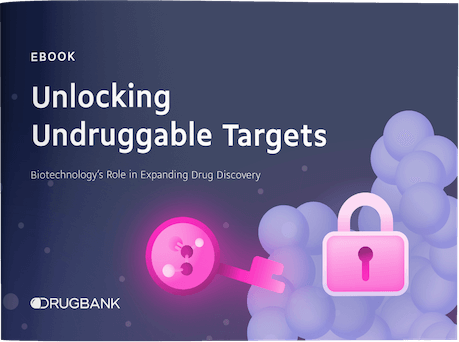Explore a selection of our essential drug information below, or:
Identification
- Summary
Formaldehyde is a naturally occurring hazardous organic compound used as a preservative in animal feed, cosmetic products, laboratory procedures, disinfection, and home building products.
- Brand Names
- Forma-ray, Formadon
- Generic Name
- Formaldehyde
- DrugBank Accession Number
- DB03843
- Background
A highly reactive aldehyde gas formed by oxidation or incomplete combustion of hydrocarbons. In solution, it has a wide range of uses: in the manufacture of resins and textiles, as a disinfectant, and as a laboratory fixative or preservative. Formaldehyde solution (formalin) is considered a hazardous compound, and its vapor toxic. (From Reynolds, Martindale The Extra Pharmacopoeia, 30th ed, p717)
- Type
- Small Molecule
- Groups
- Approved, Vet approved
- Structure
- Weight
- Average: 30.026
Monoisotopic: 30.010564686 - Chemical Formula
- CH2O
- Synonyms
- Formaldehído
- Formaldehyd
- Formaldehyde
- Formaldehyde solution
- Formalin
- Formic aldehyde
- Formol
- Methanal
- Methyl aldehyde
- Methylene oxide
- Oxomethane
- Oxomethylene
- Oxymethylene
- Paraform
- External IDs
- NSC-298885
Pharmacology
- Indication
Use for drying skin before or after surgical removal of warts or where dryness is required.
 Reduce drug development failure ratesBuild, train, & validate machine-learning modelswith evidence-based and structured datasets.Build, train, & validate predictive machine-learning models with structured datasets.
Reduce drug development failure ratesBuild, train, & validate machine-learning modelswith evidence-based and structured datasets.Build, train, & validate predictive machine-learning models with structured datasets.- Contraindications & Blackbox Warnings
 Prevent Adverse Drug Events TodayTap into our Clinical API for life-saving information on contraindications & blackbox warnings, population restrictions, harmful risks, & more.Avoid life-threatening adverse drug events with our Clinical API
Prevent Adverse Drug Events TodayTap into our Clinical API for life-saving information on contraindications & blackbox warnings, population restrictions, harmful risks, & more.Avoid life-threatening adverse drug events with our Clinical API- Pharmacodynamics
Not Available
- Mechanism of action
Target Actions Organism ATransient receptor potential cation channel subfamily A member 1 activatorHumans UHematopoietic stem cells Not Available Humans UD-alanyl-D-alanine carboxypeptidase Not Available Streptomyces sp. (strain R61) - Absorption
Not Available
- Volume of distribution
Not Available
- Protein binding
Not Available
- Metabolism
- Not Available
- Route of elimination
Not Available
- Half-life
Not Available
- Clearance
Not Available
- Adverse Effects
 Improve decision support & research outcomesWith structured adverse effects data, including: blackbox warnings, adverse reactions, warning & precautions, & incidence rates. View sample adverse effects data in our new Data Library!Improve decision support & research outcomes with our structured adverse effects data.
Improve decision support & research outcomesWith structured adverse effects data, including: blackbox warnings, adverse reactions, warning & precautions, & incidence rates. View sample adverse effects data in our new Data Library!Improve decision support & research outcomes with our structured adverse effects data.- Toxicity
Acute oral toxicity (LD50): 42 mg/kg [Mouse].
- Pathways
- Pharmacogenomic Effects/ADRs
- Not Available
Interactions
- Drug Interactions
- This information should not be interpreted without the help of a healthcare provider. If you believe you are experiencing an interaction, contact a healthcare provider immediately. The absence of an interaction does not necessarily mean no interactions exist.
Drug Interaction Integrate drug-drug
interactions in your softwareCalcium carbimide The risk or severity of adverse effects can be increased when Calcium carbimide is combined with Formaldehyde. Disulfiram The risk or severity of adverse effects can be increased when Disulfiram is combined with Formaldehyde. - Food Interactions
- No interactions found.
Products
 Drug product information from 10+ global regionsOur datasets provide approved product information including:dosage, form, labeller, route of administration, and marketing period.Access drug product information from over 10 global regions.
Drug product information from 10+ global regionsOur datasets provide approved product information including:dosage, form, labeller, route of administration, and marketing period.Access drug product information from over 10 global regions.- Brand Name Prescription Products
Name Dosage Strength Route Labeller Marketing Start Marketing End Region Image Forma-Ray Liquid .2 mL/59mL Topical Gordon Laboratories 2010-07-15 Not applicable US Formadon Liquid 0.1 mL/59mL Topical Gordon Laboratories 2010-06-21 Not applicable US Formalaz Liquid 100 mg/1g Topical River's Edge Pharmaceuticals, LLC 2006-09-16 2012-10-31 US Formaldehyde Solution 100 mg/1mL Topical Rochester Pharmaceuticals 2011-04-27 2019-07-08 US Formaldehyde Liquid 8.505 g/88.72059mL Topical Breckenridge Pharmaceutical, Inc. 2009-01-01 2010-10-31 US - Mixture Products
Name Ingredients Dosage Route Labeller Marketing Start Marketing End Region Image British Army Foot Pwr Formaldehyde (.75 mg / 100 mg) + Boric acid (6 mg / 100 mg) + Salicylic acid (3 mg / 100 mg) + Zinc oxide (6 mg / 100 mg) Powder Topical Regal Pharms, Division Of Bradcan Corporation 1980-12-31 2001-07-11 Canada Root Canal Therapy Formaldehyde (19 %) + Cresol (35 %) Liquid Dental Amd Medicom Inc. 1999-11-26 2006-08-03 Canada T.R.U.E. Test Thin-Layer Rapid Use Patch Test Formaldehyde (146 ug/48h) + 2,2'-Dibenzothiazyl disulfide (20 ug/48h) + 2-mercaptobenzothiazole (61 ug/48h) + 4-(Isopropylamino)diphenylamine (10 ug/48h) + Bacitracin (486 ug/48h) + Balsam of Peru (648 ug/48h) + Benzocaine (378 ug/48h) + Benzylparaben (162 ug/48h) + Bisphenol A diglycidyl ether (32 ug/48h) + Bromothalonil (4 ug/48h) + Bronopol (203 ug/48h) + Budesonide (0.8 ug/48h) + Butylparaben (162 ug/48h) + Chlorquinaldol (77 ug/48h) + Cinchocaine hydrochloride (66 ug/48h) + Cinnamaldehyde (41 ug/48h) + Cinnamyl alcohol (63 ug/48h) + Clioquinol (77 ug/48h) + Cobalt chloride hexahydrate (4 ug/48h) + Diazolidinylurea (446 ug/48h) + Potassium dichromate (15.7 ug/48h) + Dipentamethylenethiuram disulfide (5.5 ug/48h) + Diphenylguanidine (68 ug/48h) + Disperse Blue 106 (41 ug/48h) + Disulfiram (5.5 ug/48h) + Ditiocarb zinc (68 ug/48h) + Ethyl hydroxybenzoate (162 ug/48h) + Ethylenediamine (18 ug/48h) + Eugenol (41 ug/48h) + Evernia prunastri (81 ug/48h) + Geraniol (81 ug/48h) + Hydrocortisone butyrate (16 ug/48h) + Hydroxycitronellal (63 ug/48h) + Imidurea (486 ug/48h) + Isoeugenol (17 ug/48h) + Lanolin alcohols (810 ug/48h) + Methylchloroisothiazolinone (3 ug/48h) + Methylparaben (162 ug/48h) + Morpholinylmercaptobenzothiazole (20 ug/48h) + N,N'-diphenyl-1,4-phenylenediamine (25 ug/48h) + N-Cyclohexyl-N'-phenyl-1,4-phenylenediamine (25 ug/48h) + Neomycin sulfate (486 ug/48h) + Nickel sulfate hexahydrate (36 ug/48h) + Parthenolide (2 ug/48h) + Propylparaben (162 ug/48h) + Quaternium-15 (81 ug/48h) + Rosin (972 ug/48h) + Sodium aurotiosulfate (23 ug/48h) + Tetracaine hydrochloride (66 ug/48h) + Tetramethylthiuram monosulfide (5.5 ug/48h) + Thimerosal (6 ug/48h) + Thiohexam (20 ug/48h) + Thiram (5.5 ug/48h) + Tixocortol pivalate (2 ug/48h) + Zinc dibutyldithiocarbamate (68 ug/48h) + alpha-Amyl cinnamaldehyde (17 ug/48h) + p-Phenylenediamine (65 ug/48h) + p-tert-Butylphenol-formaldehyde resin (low molecular weight) (36 ug/48h) Kit Cutaneous SmartPractice Denmark ApS 2012-03-01 Not applicable US - Unapproved/Other Products
Name Ingredients Dosage Route Labeller Marketing Start Marketing End Region Image Forma-Ray Formaldehyde (.2 mL/59mL) Liquid Topical Gordon Laboratories 2010-07-15 Not applicable US Formadon Formaldehyde (0.1 mL/59mL) Liquid Topical Gordon Laboratories 2010-06-21 Not applicable US Formalaz Formaldehyde (100 mg/1g) Liquid Topical River's Edge Pharmaceuticals, LLC 2006-09-16 2012-10-31 US Formaldehyde Formaldehyde (100 mg/1mL) Solution Topical Rochester Pharmaceuticals 2011-04-27 2019-07-08 US Formaldehyde Formaldehyde (8.505 g/88.72059mL) Liquid Topical Breckenridge Pharmaceutical, Inc. 2009-01-01 2010-10-31 US
Categories
- Drug Categories
- Chemical TaxonomyProvided by Classyfire
- Description
- This compound belongs to the class of organic compounds known as carbonyl compounds. These are organic compounds containing a carbonyl group, with the general structure RC(=O)R', where R=organyl, R'=H, N, O, organyl group or halide group.
- Kingdom
- Organic compounds
- Super Class
- Organic oxygen compounds
- Class
- Organooxygen compounds
- Sub Class
- Carbonyl compounds
- Direct Parent
- Carbonyl compounds
- Alternative Parents
- Organic oxides / Hydrocarbon derivatives
- Substituents
- Aliphatic acyclic compound / Carbonyl group / Hydrocarbon derivative / Organic oxide
- Molecular Framework
- Aliphatic acyclic compounds
- External Descriptors
- one-carbon compound, aldehyde (CHEBI:16842) / an <i>n</i>-alkanal (FORMALDEHYDE)
- Affected organisms
- Not Available
Chemical Identifiers
- UNII
- 1HG84L3525
- CAS number
- 50-00-0
- InChI Key
- WSFSSNUMVMOOMR-UHFFFAOYSA-N
- InChI
- InChI=1S/CH2O/c1-2/h1H2
- IUPAC Name
- formaldehyde
- SMILES
- [H]C([H])=O
References
- Synthesis Reference
Walter Hasselman, Jr., "Process for the preparation of phenol-urea-formaldehyde condensation products." U.S. Patent US4345061, issued August, 1926.
US4345061- General References
- Not Available
- External Links
- Human Metabolome Database
- HMDB0001426
- KEGG Drug
- D00017
- KEGG Compound
- C00067
- PubChem Compound
- 712
- PubChem Substance
- 46505094
- ChemSpider
- 692
- 314636
- ChEBI
- 16842
- ChEMBL
- CHEMBL1255
- PharmGKB
- PA449703
- Guide to Pharmacology
- GtP Drug Page
- PDBe Ligand
- FOR
- Drugs.com
- Drugs.com Drug Page
- Wikipedia
- Formaldehyde
- PDB Entries
- 1jlx / 1jly / 1oao / 1pw1 / 1r1l / 1rdg / 1wyk / 2rus / 2wyl / 3etc … show 20 more
- MSDS
- Download (82.2 KB)
Clinical Trials
- Clinical Trials
Clinical Trial & Rare Diseases Add-on Data Package
Explore 4,000+ rare diseases, orphan drugs & condition pairs, clinical trial why stopped data, & more. Preview package Phase Status Purpose Conditions Count Start Date Why Stopped 100+ additional columns Unlock 175K+ rows when you subscribe.View sample dataNot Available Completed Not Available Tick Borne Encephalitis (TBE) 1 somestatus stop reason just information to hide 4 Completed Prevention Tick Borne Encephalitis (TBE) 1 somestatus stop reason just information to hide 3 Completed Prevention Tick Borne Encephalitis (TBE) 1 somestatus stop reason just information to hide
Pharmacoeconomics
- Manufacturers
- Not Available
- Packagers
- AIG Technologies Inc.
- Breckenridge Pharmaceuticals
- DSHealthcare Inc.
- Epic Pharma LLC
- Gordon Laboratories
- Harmony Laboratories Inc.
- Moyco Union Broach
- PEDiNOL
- River's Edge Pharmaceuticals
- Dosage Forms
Form Route Strength Powder Topical Liquid Topical .2 mL/59mL Liquid Topical 0.1 mL/59mL Liquid Topical 100 mg/1g Liquid Topical 8.505 g/88.72059mL Solution Topical 100 mg/1mL Liquid Dental Kit Cutaneous - Prices
- Not Available
- Patents
- Not Available
Properties
- State
- Gas
- Experimental Properties
Property Value Source melting point (°C) -92 °C PhysProp boiling point (°C) -19.1 °C PhysProp water solubility 4E+005 mg/L (at 20 °C) PICKRELL,JA ET AL. (1983) logP 0.35 HANSCH,C ET AL. (1995) pKa 13.3 (at 25 °C) SERJEANT,EP & DEMPSEY,B (1979) - Predicted Properties
Property Value Source Water Solubility 198.0 mg/mL ALOGPS logP -0.68 ALOGPS logP -0.47 Chemaxon logS 0.82 ALOGPS pKa (Strongest Basic) -8.1 Chemaxon Physiological Charge 0 Chemaxon Hydrogen Acceptor Count 1 Chemaxon Hydrogen Donor Count 0 Chemaxon Polar Surface Area 17.07 Å2 Chemaxon Rotatable Bond Count 0 Chemaxon Refractivity 6.31 m3·mol-1 Chemaxon Polarizability 2.58 Å3 Chemaxon Number of Rings 0 Chemaxon Bioavailability 1 Chemaxon Rule of Five Yes Chemaxon Ghose Filter No Chemaxon Veber's Rule Yes Chemaxon MDDR-like Rule No Chemaxon - Predicted ADMET Features
Property Value Probability Human Intestinal Absorption + 0.9757 Blood Brain Barrier + 0.982 Caco-2 permeable + 0.7834 P-glycoprotein substrate Non-substrate 0.8663 P-glycoprotein inhibitor I Non-inhibitor 0.9633 P-glycoprotein inhibitor II Non-inhibitor 0.9831 Renal organic cation transporter Non-inhibitor 0.9145 CYP450 2C9 substrate Non-substrate 0.8628 CYP450 2D6 substrate Non-substrate 0.9157 CYP450 3A4 substrate Non-substrate 0.8203 CYP450 1A2 substrate Non-inhibitor 0.8503 CYP450 2C9 inhibitor Non-inhibitor 0.9662 CYP450 2D6 inhibitor Non-inhibitor 0.9735 CYP450 2C19 inhibitor Non-inhibitor 0.9531 CYP450 3A4 inhibitor Non-inhibitor 0.977 CYP450 inhibitory promiscuity Low CYP Inhibitory Promiscuity 0.9443 Ames test AMES toxic 0.645 Carcinogenicity Carcinogens 0.6567 Biodegradation Ready biodegradable 0.7562 Rat acute toxicity 2.5082 LD50, mol/kg Not applicable hERG inhibition (predictor I) Weak inhibitor 0.9573 hERG inhibition (predictor II) Non-inhibitor 0.9823
Spectra
- Mass Spec (NIST)
- Not Available
- Spectra
- Chromatographic Properties
Collision Cross Sections (CCS)
Adduct CCS Value (Å2) Source type Source [M-H]- 109.41712 predictedDeepCCS 1.0 (2019) [M-H]- 109.41712 predictedDeepCCS 1.0 (2019) [M+H]+ 111.18172 predictedDeepCCS 1.0 (2019) [M+H]+ 111.18172 predictedDeepCCS 1.0 (2019) [M+Na]+ 117.95737 predictedDeepCCS 1.0 (2019) [M+Na]+ 117.95737 predictedDeepCCS 1.0 (2019)
Targets

- Kind
- Protein
- Organism
- Humans
- Pharmacological action
- Yes
- Actions
- Activator
- General Function
- Ligand-activated Ca(2+)-permeable, nonselective cation channel involved in pain detection and possibly also in cold perception, oxygen concentration perception, cough, itch, and inner ear function (PubMed:17259981, PubMed:21195050, PubMed:21873995, PubMed:23199233, PubMed:25389312, PubMed:33152265). Has a relatively high Ca(2+) selectivity, with a preference for divalent over monovalent cations (Ca(2+) > Ba(2+) > Mg(2+) > NH4(+) > Li(+) > K(+)), the influx of cation into the cytoplasm leads to membrane depolarization (PubMed:19202543, PubMed:21195050). Has a central role in the pain response to endogenous inflammatory mediators, such as bradykinin and to a diverse array of irritants. Activated by a large variety of structurally unrelated electrophilic and non-electrophilic chemical compounds, such as allylthiocyanate (AITC) from mustard oil or wasabi, cinnamaldehyde, diallyl disulfide (DADS) from garlic, and acrolein, an environmental irritant (PubMed:20547126, PubMed:25389312, PubMed:27241698, PubMed:30878828). Electrophilic ligands activate TRPA1 by interacting with critical N-terminal Cys residues in a covalent manner (PubMed:17164327, PubMed:27241698, PubMed:31866091, PubMed:32641835). Non-electrophile agonists bind at distinct sites in the transmembrane domain to promote channel activation (PubMed:33152265). Acts also as an ionotropic cannabinoid receptor by being activated by delta(9)-tetrahydrocannabinol (THC), the psychoactive component of marijuana (PubMed:25389312). May be a component for the mechanosensitive transduction channel of hair cells in inner ear, thereby participating in the perception of sounds (By similarity)
- Specific Function
- calcium channel activity
- Gene Name
- TRPA1
- Uniprot ID
- O75762
- Uniprot Name
- Transient receptor potential cation channel subfamily A member 1
- Molecular Weight
- 127499.88 Da
References
- Zhou Y, Zhang Y, Zhao D, Yu X, Shen X, Zhou Y, Wang S, Qiu Y, Chen Y, Zhu F: TTD: Therapeutic Target Database describing target druggability information. Nucleic Acids Res. 2024 Jan 5;52(D1):D1465-D1477. doi: 10.1093/nar/gkad751. [Article]
References
- Goldstein BD: Hematological and toxicological evaluation of formaldehyde as a potential cause of human leukemia. Hum Exp Toxicol. 2011 Jul;30(7):725-35. doi: 10.1177/0960327110381682. Epub 2010 Aug 20. [Article]
- Kind
- Protein
- Organism
- Streptomyces sp. (strain R61)
- Pharmacological action
- Unknown
- General Function
- Catalyzes distinct carboxypeptidation and transpeptidation reactions during the last stages of wall peptidoglycan synthesis. Mistaking a beta-lactam antibiotic molecule for a normal substrate (i.e. a D-alanyl-D-alanine-terminated peptide), it becomes immobilized in the form of a long-lived, serine-ester-linked acyl enzyme and thus behave as penicillin-binding protein (PBP).
- Specific Function
- serine-type D-Ala-D-Ala carboxypeptidase activity
- Gene Name
- Not Available
- Uniprot ID
- P15555
- Uniprot Name
- D-alanyl-D-alanine carboxypeptidase
- Molecular Weight
- 42916.725 Da
Drug created at June 13, 2005 13:24 / Updated at August 26, 2024 19:21


